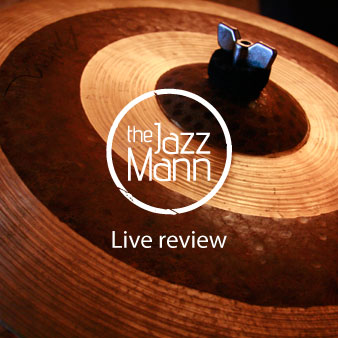
by Tim Owen
December 09, 2009
/ LIVE
The final silence when it came was greeted by a spontaneous ovation for this great band.
Profound Sound Trio
Vortex, London
23 November 2009
Andrew Cyrille; drums
Paul Dunmall; tenor and soprano sax, clarinet
Henry Grimes; double bass, violin
I didn’t know what I could realistically expect of the Profound Sound trio. Henry Grimes, its bassist, is a 74 year old musician whose 35 year break from music ended only six years ago. The drummer, Andrew Cyrille, has also recently celebrated 70 years. Grimes owes his legendary status in free music in great part to his mid-60’s recordings with Albert Ayler. Cyrille is equally renowned for a nonpareil career that has included a close association with Cecil Taylor. The trio is completed by reed multi-instrumentalist Paul Dunmall, a mere 56, and in many ways a vital ingredient here, since he is able to step up as a musician on equal terms to his colleagues as a player firmly in the tradition that Grimes and Cyrille helped to germinate, but with his own fresh take on the sound. As the trio took to the Vortex stage for what we were told would be one unbroken set, both elder musicians’ mien was inscrutable until the moment Henry Grimes cast a glance inquisitively, perhaps a little apprehensively, over the packed house. Andrew Cyrille remained impassive right up until the moment Paul Dunmall started to play, at which point both Cyrille and Grimes began to relax to the task at hand.
The trio set out with a rather sketchy restraint, Dunmall soloing as Grimes contributed simple, resonant bass lines and Cyrille restricted himself to percussive comments from the drum stool. For his introduction to the second number Grimes switched to violin, with the others at first remaining respectfully silent. Dunmall then joined in, worrying away at a particular motif, examining it repeatedly from just a couple of angles. Cyrille and Dunmall wrapped the piece up with a duet, but Cyrille didn’t really get fired up until the third number, which saw him playing more aggressively off Grimes’ arco. In each of these early pieces the trio were apparently constructing musical frameworks around silence, probing outwards but always ready to concede ground where that would enable the group to draw things satisfyingly, coherently together. Nothing seemed suggestive or tentative; I’d say the trio were simply, expertly sounding each other out, getting a feel for the contours of the music and of how it might differ from the many other forms they might construct.
At the half hour mark the trio had settled into a rock-steady, bustling mid-pace rhythm overlaid by rippling squalls of soprano sax. Cyrille and Grimes then broke into a taut, clipped drum pattern and a coarse, locomotive bass pulse respectively, in beautiful counterpoint to the high pure tone of the soprano. This they developed into a forceful, coherent trio workout with Dunmall astonishingly fleet and fluent, free to blow as hard as he pleased without any fear of grandstanding, since with a ?rhythm section’ this experienced it’s never going to be all about any individual voice. This passage came to a crisp halt with Cyrille striking and then leaning in to damp the splash cymbal before launching into a solo, taken mostly on his padded stool but also ranging across one of the venue’s steel girders and back to his kit, all the while a smile playing across his face that confirmed a love for the music that was already amply evident. I don’t think I’ve ever heard skins hit harder. The following moment’s silence allowed everyone to breathe again.
As Grimes turned again to his violin, an instrument he’s played in public only in the past four years and on which he betrays just the merest hint of Ornette Coleman’s fauvism, Dunmall picked up his clarinet for a solo. As Grimes created bedrock skeins of sound with some pretty raw folk inflections, Dunmall’s tone was idiosyncratically abstract, though he moved through one passage that evoked a warm glow of nostalgia. On the hour bass and drums set out again from ground zero with some sparse and protean sound making which, typically, Dunmall then subverted by entering on tenor for a mid tempo, R&B-drenched solo. Grimes’ pulse cohered into a walking rhythm and Cyrille worked up an astonishing display of perpetual percussive motion, having apparently grown additional limbs for the purpose. And it was Cyrille who bought the gig to a climax, Dunmall being content to echo a multi-note bass pulse from Grimes. The final silence when it came was greeted by a spontaneous ovation.
They played one brief encore which, despite some initially anguished-sounding soprano sax, was rhythmically sedate in a predominantly bright, sprightly and up-tempo way that recalled John Coltrane’s intro to Big Nick, casually underlining the specificity and concision of all this great bands’ musical choices.
blog comments powered by Disqus